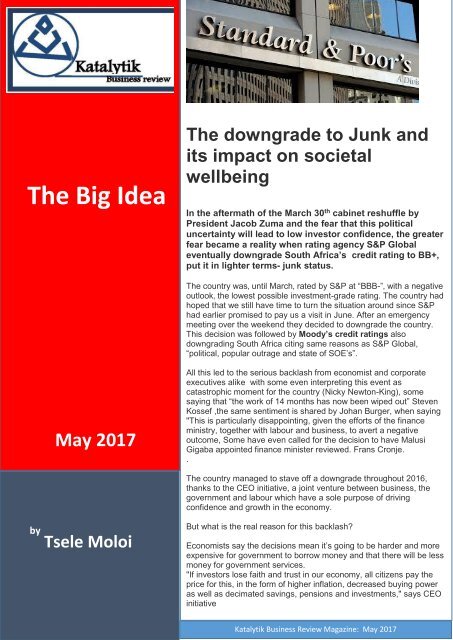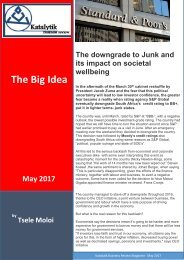Katalytik Business Review Magazine, SA Down grade interview Ayabonga
Create successful ePaper yourself
Turn your PDF publications into a flip-book with our unique Google optimized e-Paper software.
The Big Idea<br />
The down<strong>grade</strong> to Junk and<br />
its impact on societal<br />
wellbeing<br />
In the aftermath of the March 30 th cabinet reshuffle by<br />
President Jacob Zuma and the fear that this political<br />
uncertainty will lead to low investor confidence, the greater<br />
fear became a reality when rating agency S&P Global<br />
eventually down<strong>grade</strong> South Africa’s credit rating to BB+,<br />
put it in lighter terms- junk status.<br />
The country was‚ until March‚ rated by S&P at “BBB-”‚ with a negative<br />
outlook‚ the lowest possible investment-<strong>grade</strong> rating. The country had<br />
hoped that we still have time to turn the situation around since S&P<br />
had earlier promised to pay us a visit in June. After an emergency<br />
meeting over the weekend they decided to down<strong>grade</strong> the country.<br />
This decision was followed by Moody’s credit ratings also<br />
downgrading South Africa citing same reasons as S&P Global,<br />
“political, popular outrage and state of SOE’s”.<br />
May 2017<br />
All this led to the serious backlash from economist and corporate<br />
executives alike with some even interpreting this event as<br />
catastrophic moment for the country (Nicky Newton-King), some<br />
saying that “the work of 14 months has now been wiped out” Steven<br />
Kossef ,the same sentiment is shared by Johan Burger, when saying<br />
"This is particularly disappointing, given the efforts of the finance<br />
ministry, together with labour and business, to avert a negative<br />
outcome, Some have even called for the decision to have Malusi<br />
Gigaba appointed finance minister reviewed. Frans Cronje.<br />
.<br />
The country managed to stave off a down<strong>grade</strong> throughout 2016,<br />
thanks to the CEO initiative, a joint venture between business, the<br />
government and labour which have a sole purpose of driving<br />
confidence and growth in the economy.<br />
by<br />
Tsele Moloi<br />
But what is the real reason for this backlash?<br />
Economists say the decisions mean it’s going to be harder and more<br />
expensive for government to borrow money and that there will be less<br />
money for government services.<br />
"If investors lose faith and trust in our economy, all citizens pay the<br />
price for this, in the form of higher inflation, decreased buying power<br />
as well as decimated savings, pensions and investments," says CEO<br />
initiative<br />
<strong>Katalytik</strong> <strong>Business</strong> <strong>Review</strong> <strong>Magazine</strong>: May 2017
To understand the real issues here, understanding how leadership decisions and<br />
approaches impact the societal wellbeing. <strong>Katalytik</strong> <strong>Business</strong> <strong>Review</strong> as the Bellwether<br />
of leadership and the vanguard of society’s wellbeing went out to find answers.<br />
The first person we contacted for answers was <strong>Ayabonga</strong> Cawe Development Economist<br />
and Executive content and research at power FM.<br />
<strong>Katalytik</strong> <strong>Business</strong> <strong>Review</strong> (KRB): There is a story of tough time ahead of us in the country, How does this<br />
impact the poor and the working class in the immediate term?<br />
<strong>Ayabonga</strong> Cawe: The ways are numerous : higher food price inflation (and things like transport as well) due to a<br />
weakening rand, higher cost of credit (especially if the response from the MPC to inflationary expectations is to hike<br />
rates).<br />
KBR: How will this affect the prospect of job seekers in finding employment?<br />
AC: well higher transport costs translate into higher search costs for many (due to Apartheid spatial planning ) who<br />
are looking for work far from where they live.<br />
KBR: Does it matter?<br />
AC: It does matter. A great deal, especially in an economy wherein the relationship between survival and<br />
productive work is often a vulnerable one, its a matter of life and death, and has a huge spillover in terms of<br />
KBR: If there is not much impact for the poor in the short run as some of the economist have said, Is there<br />
any truth in the statement that we are all waking up poorer this morning?.<br />
AC: Well, who is 'we'? if we accept that this is a sovereign down<strong>grade</strong> (a down<strong>grade</strong> of debt that is issued by a<br />
government that we all collectively own), then yes it means more money may need to go to 'debt-servicing' and less<br />
money towards education, housing, healthcare and transport etc as part of a social wage. We are all the poorer for<br />
it, although not to the same extent because our stake in the 'system' isn't the same.<br />
KBR: Nicky newton King calls it catastrophe, Do you see it as being catastrophic for society at large and<br />
the poor in particular?<br />
AC: Many of the poor are already living in a catastrophic normalisation of the social crisis of post Apartheid South<br />
Africa, the real catastrophy I imagine, will be the segments of society which through debt access and stable<br />
incomes have insulated themselves from the crisis (the lower middle classes, blue collar segment etc.), who are<br />
now increasingly vulnerable<br />
KBR: Does turning around this situation help the poor taking into account that even during the economic<br />
boom the poor are not sharing in the benefits?<br />
AC: we chase growth for growth's sake at our own peril. The silver lining here I guess, is that it presents an<br />
opportunity to change the driving basis of our growth away from exclusive focus on commodities, high level finance<br />
and other sectors, towards restructuring our economy through land reform, reform of urban property relations,<br />
financial inclusion and free education to ensure that when commodity prices rebound, structurally we have a<br />
different society<br />
KBR: What impact does it have on the banking sector and how will that affect financial inclusion of the<br />
poor?<br />
AC: Well the banks have been down<strong>grade</strong>d as well, meaning that its going to be more difficult to secure inter-bank<br />
loans (which might now cost LIBOR plus whatever our risk is quantified at by these agencies). But the<br />
banks aren't the only stakeholder in the debate on inclusion, and this may be an opportunity for our regulators and<br />
informal savings and landings vehicles to step up to meet the demand the commercial banks have either priced out<br />
of their market or just ignore<br />
KBR: ANCWL and ANCYL are saying South Africa cannot be held to ransom by rating agencies that are<br />
serving certain political agenda, is there any merit in their statement?<br />
AC: Well if we want to make those statements (which are justified and true), we must understand<br />
that we can't borrow in the manner we've been borrowing. We are at the 'mercy' of these discredited<br />
agencies because we don't mobilise enough domestic savings, nor do we have any other means<br />
beyond the capital markets to finance our trade and budget deficits. Just like its nice to swear at the<br />
furniture store, it won't give you a better credit score nor space, until you pay them, they'll continue<br />
to listen to Credit Bureau. Its as simple as that.<br />
<strong>Katalytik</strong> <strong>Business</strong> <strong>Review</strong> <strong>Magazine</strong>: May 2017



